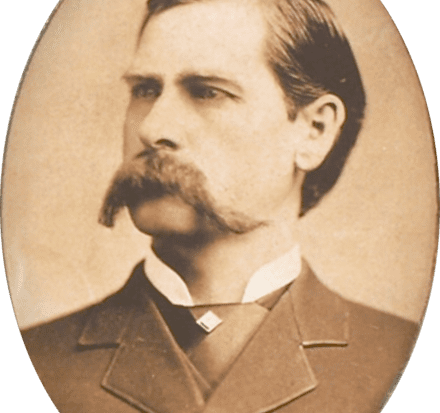
It’s strange that Gunsmoke’s U.S. Marshall Matt Dillon did not require all the rough-and-tumble cowboys arriving in town from cattle herding to turn in their guns at Dillon’s office before going to the Long Branch Saloon for heavy drinking and womanizing. Dillon preferred to out-quick-draw the bad guys and send them to Boot Hill, and that is the opening scene that introduces every episode of Gunsmoke, which aired on television for 22 seasons.
In that opening scene, viewers see Marshall Dillon, at “high noon” on Dodge City’s main street, doing a fast draw and dispatching another bad guy to Boot Hill. In the streets of Dodge City, the law was quick and decisive.
However, in the 1957 episode titled “Bureaucrat,” a federal agent is sent to Dodge City to implement gun control (turn in all guns at the sheriff’s office). That policy failed miserably because individuals began wearing hidden derringers.
Yet, in a number of the 1950s and 1960s Hollywood televised westerns and films, the approach to the maintenance of law and order in the Old West was framed in the way the local sheriff required all citizens, especially wild cowboys just off the range and hired gunslingers, to turn over their guns at the sheriff’s office. Law, order and peace would follow this regulation.
In the scripts written for television and movies, not one cowpoke or hired gun argued for a Second Amendment right to bear arms and keep his Colt 45 in a public carry. Hollywood has produced numerous television dramas from The Rifleman to Bat Masterson to Gunsmoke, revealing how courageous western sheriffs cleaned up the wild, wild west and made law and order a staple of peace and safety in the Old West.
By the 1880s, many pioneer newspapers advocated some version of gun control. The Black Hills Daily Times called carrying guns a “dangerous practice.” The Montana Yellowstone Journal called for gun regulation, and another paper called packing a gun “a senseless custom.”
In modern-day television dramas, such as The Streets of San Francisco, however, the wild, wild west of crime and disorder resurfaced within the urban “outlaw culture” of narcissistic individualism, greed and aimless violence expressed in the musical cultural form of gangsta rap. One such song in 1991, “Mind Playing Tricks on Me,” was a hit by the group Geto Boys. One stanza includes the words “sleeping with my finger on the trigger.”
Young Black men in today’s violent outlaw urban culture are comparable to Africa’s child soldiers. The essence of the song expresses the paranoia of real ghetto boys living in a state of fear. Ergo, the hue and cry of the Second Amendment to protect and serve when Marshall Dillon or his modern prototype, Dirty Harry, are not around to save the day.
Specifically, the National Rifle Association (NRA) has used the public fear of urban disorder to argue the Second Amendment gives each American citizen the right to own her or his own Colt 45 or AR-15 assault rifle.
The classic 1955 film Wichita starred Joel McCray as Wyatt Earp. The plot revolves around the motto of the town, posted on a banner at the entrance to the town, which reads, “Anything Goes in Wichita.”
After some drunken cowherders shoot up the town and accidentally kill a young boy, Earp is hired as sheriff to clean up the town and make it safe for law-abiding citizens. Earp accomplishes this by requiring all who enter Wichita to hand over their guns to the sheriff’s office until they leave town. No wild cowboys objected by shouting out their Second Amendment rights.
However, in today’s American streets of outlaw culture, with the rabid support of the GOP and the NRA, the Second Amendment is used to defend the right to own assault weapons, which have been used to kill children in elementary schools, as in Uvalde, Texas, and Black senior citizens while they shopped for groceries in Buffalo, N.Y.
Time, space and history are important if one is to understand the complexities, inconsistencies and contradictions concerning the right to own a weapon that is produced for the mass killing of human beings. In 1994, a bipartisan Congress passed the 10-year Federal Assault Weapons Ban (AWB). President Bill Clinton signed the bill on Sept. 13. The ban ended on Sept. 13, 2004.
But with the killing of children at Sandy Hook Elementary School in Newtown, Conn., in December 2012, there was renewed effort in Congress to reinstate the AWB. Senator Dianne Feinstein (D–Calif.) introduced the bill, but it failed in the Senate by a vote of 40 to 60. Many critics and anti-gun advocates blamed the monetary power of the NRA.
Both the Obama and Biden administrations desired and publicly advocated for the previous AWB to be reinstated. Biden’s proposed ban came in the wake of the mass shootings at an Atlanta spa and in Boulder, Colo., at a grocery store, both in 2021. These calls for gun regulation fell on tightly closed ears by GOP members of Congress.
In conclusion, Americans are caught between the Matt Dillon approach to law and order and the Wyatt Earp approach. This divide is possibly insurmountable due to the money power of the NRA, or as the old gangsta notes, “Money talks” and nothing else matters.

